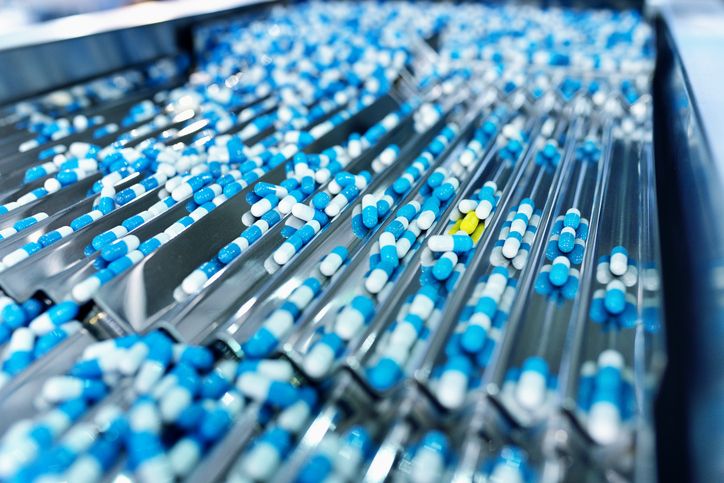 NIIMBL will help advance U.S. leadership in the biopharmaceutical industry by fostering economic development, improving medical treatments and helping to build a qualified workforce by collaborating with educational institutions to develop new training programs. The institute also will seek to develop rapid and flexible manufacturing capabilities to help manufacturers quickly respond to pandemics and other biological threats.
NIIMBL will help advance U.S. leadership in the biopharmaceutical industry by fostering economic development, improving medical treatments and helping to build a qualified workforce by collaborating with educational institutions to develop new training programs. The institute also will seek to develop rapid and flexible manufacturing capabilities to help manufacturers quickly respond to pandemics and other biological threats.
U.S. Secretary of Commerce Penny Pritzker said the institute is a resource that will “spread the risks and share the benefits across the industry” to develop and gain approval for innovative processes.
“The innovations created here will make it easier for industry to scale up production and provide the most groundbreaking new therapies to more patients sooner,” said Pritzker.
While traditional pharmaceutical production relies on chemistry, biopharmaceutical production relies on biology and living cells to produce treatments. A recent Deloitte report said the changes in biopharmaceutical portfolios and the rise of advanced manufacturing technologies have made impacts both inside and outside the sector. These shifts are driving companies to seek specialized workers and to work collaboratively on manufacturing innovation through partnerships with academic institutions, diagnostic developers, and equipment manufacturers.
The U.S. must lead the way
The Department of Commerce said that innovation is needed to allow more rapid and flexible production to meet healthcare demands and to ensure U.S. leadership in the area. The department said that while the government does not steer which new technologies get developed, it has “a critical role to play as a catalyst and convener.”
The National Network for Manufacturing Innovation program, which was founded by Manufacturing USA in 2014, partners industry, academia and government to leverage resources, collaboration and co-investment to grow innovation and commercialization in American manufacturing. The program currently has nine manufacturing innovation institutes nationwide with six more planned by year-end. These institutes are all around the country and focus on things like 3D printing, digital manufacturing, composite materials, textiles and smart manufacturing.
The institution also has received an initial investment of $129 million from participating organizations. The National Institute for Pharmaceutical Technology and Education, which is part of the NIIMBL, said the leadership has put together an impressive partnership that “will make a significant impact on biopharmaceutical manufacturing in this nation.”

Chief Executive Group exists to improve the performance of U.S. CEOs, senior executives and public-company directors, helping you grow your companies, build your communities and strengthen society. Learn more at chiefexecutivegroup.com.
0

1:00 - 5:00 pm
Over 70% of Executives Surveyed Agree: Many Strategic Planning Efforts Lack Systematic Approach Tips for Enhancing Your Strategic Planning Process
Executives expressed frustration with their current strategic planning process. Issues include:
Steve Rutan and Denise Harrison have put together an afternoon workshop that will provide the tools you need to address these concerns. They have worked with hundreds of executives to develop a systematic approach that will enable your team to make better decisions during strategic planning. Steve and Denise will walk you through exercises for prioritizing your lists and steps that will reset and reinvigorate your process. This will be a hands-on workshop that will enable you to think about your business as you use the tools that are being presented. If you are ready for a Strategic Planning tune-up, select this workshop in your registration form. The additional fee of $695 will be added to your total.

2:00 - 5:00 pm
Female leaders face the same issues all leaders do, but they often face additional challenges too. In this peer session, we will facilitate a discussion of best practices and how to overcome common barriers to help women leaders be more effective within and outside their organizations.
Limited space available.

10:30 - 5:00 pm
General’s Retreat at Hermitage Golf Course
Sponsored by UBS
General’s Retreat, built in 1986 with architect Gary Roger Baird, has been voted the “Best Golf Course in Nashville” and is a “must play” when visiting the Nashville, Tennessee area. With the beautiful setting along the Cumberland River, golfers of all capabilities will thoroughly enjoy the golf, scenery and hospitality.
The golf outing fee includes transportation to and from the hotel, greens/cart fees, use of practice facilities, and boxed lunch. The bus will leave the hotel at 10:30 am for a noon shotgun start and return to the hotel after the cocktail reception following the completion of the round.